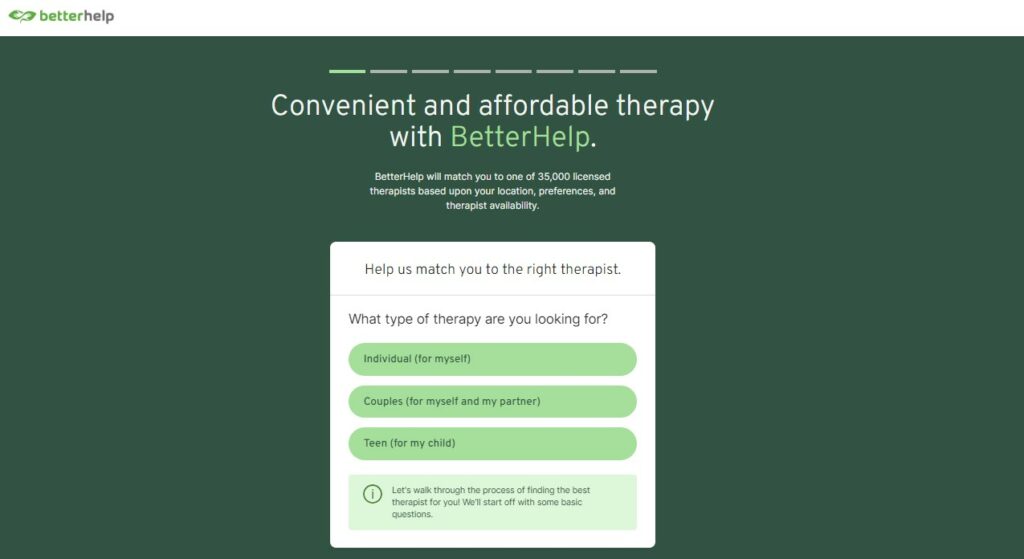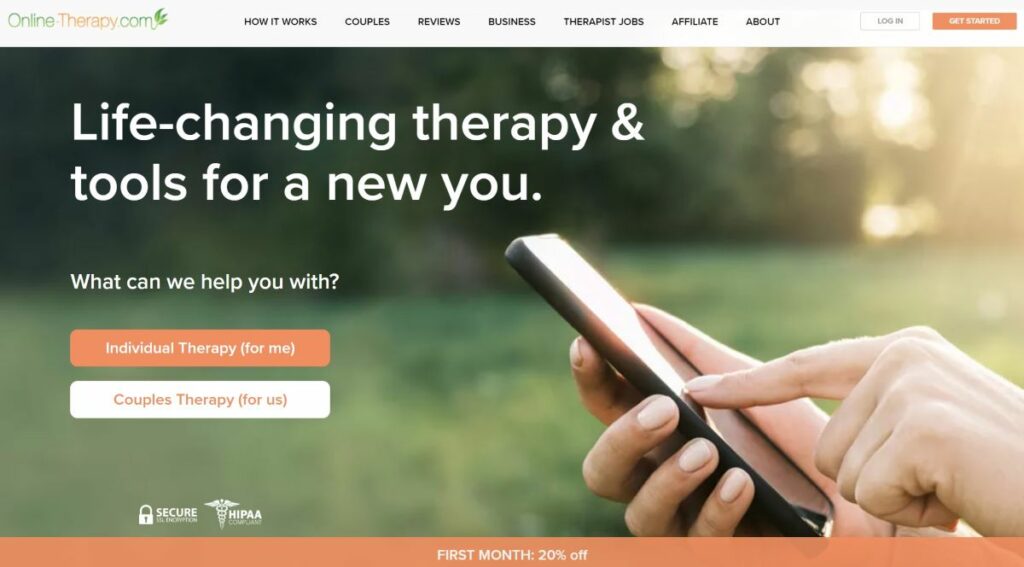If you are an empath or highly sensitive person (HSP), you have a unique set of challenges to face.
Choosing a mental health professional who is well-versed in how to support HSPs is imperative to help you manage your empathic abilities and the overwhelming emotions that come with them.
In this guide, we’ll discuss the five best counseling services for highly sensitive people, so you can master your empathic gift.
Want to skip right to the suggestions for empath therapists? Here are our 5 recommended therapy solutions:
Best empath therapist near me
As an empath or a highly sensitive person, your therapist must understand how to support you as an HSP. Many professional counselors are not able to provide sufficient support and treatment for empaths and HSPs because they do not understand just how deeply their client’s sensitivity affects every aspect of their life.
If your searches for an empath therapist near me are coming up empty, we’ve got some good news for you – online platforms are changing the ways empaths and HSPs receive mental health support and services.
| Providers | Good For | Location | Pricing |
|---|---|---|---|
| BetterHelp | Quick match with the right therapist four you | Online therapy | $65 to $90 per week (billed every 4 weeks) |
| Online-therapy.com | Finding licensed and experienced therapists with a Cognitive Behavioral Therapy (CBT) approach | Online therapy | $40/week to $88/week (including our 20% discount first month) |
| Find-a-therapist.com | Finding and contacting the right therapist for you | Online and in-person therapy | Varies depending on the counselor fee |
| Calmerry | Depression therapy, online grief counseling, anxiety therapy, therapy for OCD, self-esteem therapy | Online therapy | $49.50 to $73.75 per week (billed monthly) |
| TalkSpace | Anger management, depression, anxiety, bipolar disorder, OCD, PTSD, psychiatry | Online therapy | Varies according to insurance coverage or self-pay options |
1. BetterHelp

Explore emotional well-being with BetterHelp – your partner in affordable online therapy. With 30,000+ licensed therapists and plans starting from only $65 per week, BetterHelp makes self-care accessible to all. Complete the questionnaire to match with the right therapist.
- Good for: Quick match with the right therapist four you.
- Location: Online therapy.
- Pricing: $65 to $90 per week (billed every 4 weeks).
- Features: iOS and Android app available, message your therapist anytime, live sessions are scheduled weekly and done via live chat, phone, or video call.
BetterHelp is one of the world’s leading online counseling services. They provide a wide range of counseling options for empaths and highly sensitive people. BetterHelp has a live chat feature, giving you the option to message your therapist anytime.
Read our BetterHelp review here.
2. Online-therapy.com

Discover transformative online therapy with Online-therapy.com. Through cognitive behavioral therapy (CBT), Online-therapy.com offers individual and couples support starting at $45/week. Engage in sessions via video, voice, or text for maximum flexibility. Fill out their online questionnaire to get started.
- Good for: Finding licensed and experienced therapists with a Cognitive Behavioral Therapy (CBT) approach.
- Location: Online therapy.
- Pricing: $40/week to $88/week (including our 20% discount first month).
- Features: Unlimited messaging with your therapist, including a daily journal and activity plan, yoga and meditation videos, and tests to see your progress.
Online-therapy.com is a comprehensive online therapy website with a focus on CBT, including for highly sensitive people and empaths. By identifying and challenging negative thinking patterns, CBT can help empaths and highly sensitive people better understand how they perceive their environment and those around them.
Read our online-therapy.com review here.
3. Find-a-therapist.com

- Good for: Finding and contacting the right therapist for you.
- Location: Online and in-person therapy.
- Pricing: Varies depending on the counselor fee.
- Features: Filter your search, find accessible and effective online and in-person therapy, find guides on different types of therapy.
Find-a-therapist.com is a platform where you can have access to an online directory. You can customize your search to find the right match for you as an empath. After reviewing therapists’ profiles and choosing the right match for you, you can contact your therapist directly.
4. Calmerry

Embark on a journey of mental wellness with Calmerry. With diverse subscription options, starting at just $50, Calmerry makes prioritizing your mental health simple and accessible. You can message your therapist any day or schedule a live therapy session from the comfort of your home from any device.
- Good for: Depression therapy, online grief counseling, anxiety therapy, therapy for OCD, self-esteem therapy.
- Location: Online therapy.
- Pricing: $49.50 to $73.75 per week (billed monthly).
- Features: Message to your counselor anytime, text therapy and video therapy according to the plan you choose, free counselor switching.
Calmerry is an online service that connects you with qualified therapists with the necessary skills to address different problems empaths face. The platform matches you automatically with a therapist after an assessment.
Read our comparison between Calmerry and BetterHelp here.
5. TalkSpace

Tailored to individuals, couples, teens, and offering psychiatry services, Talkspace plans kick off at a wallet-friendly $69 per week. What’s more, many health insurances also cover their services, enhancing accessibility and affordability. Complete a questionnaire and get matched with the right therapist for you.
- Good for: Depression, anxiety, bipolar disorder, OCD, PTSD, LGBTQIA+ therapy.
- Location: Online therapy.
- Pricing: Varies according to insurance coverage or self-pay options.
- Features: Accepts insurance, pick your therapist from a list of recommendations, live video sessions and unlimited messaging with your therapist, medication management.
TalkSpace is a platform that gives you a list of therapists with the skills to provide therapy for empaths according to your answers in a short questionnaire. This way, you can choose the right therapist for you.
Read our TalkSpace review here.
What is an Empath?

An empath is someone who feels and takes on another person’s feelings. This is different from the emotion of empathy, which is something all humans can feel. Approximately 15% of the general population are empaths.
Empathy is understanding another person’s experiences by putting yourself in their shoes and seeing the world from their perspective.
Most people experience empathy on a daily basis. You might empathize with a mother carrying her screaming toddler out of a grocery store. Maybe you’ll empathize with your mail carrier walking around on a hot day, or someone on the news whose house has just burnt down. Many of us feel some type of empathy on a day-to-day basis. But the ability to empathize with other human beings is not the same thing as being an empath.
Empaths are highly sensitive, and can feel their emotions much more deeply than the average person. Their sensitivity allows them to closely identify with the world around them, and this changes the way they interact with people, places, and situations.
Being an extremely empathic person may help you bond more closely with others around you, and can help to increase your awareness of your thoughts, feelings, and beliefs.
While being an empath is often considered a gift, those with this trait tend to struggle with the sense of overwhelm that this high level of sensitivity brings to their life.
Difference Between an Empath and a Highly Sensitive Person (HSP)

Approximately 20% of individuals possess high sensitivity as an innate temperament trait. Due to their heightened nervous system reactivity, individuals with high sensitivity perceive the world with greater intensity than the average person.
They exhibit heightened sensitivity towards:
- Sensory stimuli including contact, light, sound, and odor.
- Social stimuli include receiving criticism or meeting new people.
- Emotional stimuli, including both one’s own and those of others.
There are many similarities between highly sensitive people and empaths. Both are highly sensitive to light, sounds, and smells, and are easily overstimulated and overwhelmed by their surroundings.
If you are an empath or highly sensitive person, you may find that you avoid large crowds and chaotic environments. After being out in public, you may seek out alone time to decompress and recharge.
But while both highly sensitive people and empaths are incredibly sensitive to the energies around them, an empath will absorb the energy and take it on as their own. This can wreak havoc on their lives and pose many challenges to their physical and mental health.
How do I know if I’m an Empath or a Highly Sensitive Person?
Many different traits define an empath or HSP. Due to their highly sensitive natures, these individuals can connect with people at a very deep level and tend to choose careers that focus on helping others.
Empaths and HSPs also struggle with sensitivity to their surroundings and the people in it. They thrive in environments where they have the freedom to take frequent stimulus breaks.
Here are some of the most common traits of highly sensitive and highly empathic people.
Sensitive to Their Surroundings

Different environments evoke different types of emotions and carry different moods, attitudes, and energy levels. This is especially true if you are an empath or HSP.
A quiet, candlelit yoga class will provide a much deeper sense of relaxation and peace for you than it might for someone who is not an empath. On the other hand, a crowded concert or other environments with loud noises may create stress, fear, and concern within you to the point where you need frequent breaks. You may choose to avoid chaotic environments and places you are likely to hear loud noises altogether as an empath.
Natural Helpers
Empaths and HSPs are typically fantastic listeners, and will often take the time to listen to people’s problems and understand their struggles.
As an empath, you tend to not just listen to a person’s story but actually experience it as well, like an emotional sponge. You can stand on the inside looking out and can feel how the other person perceives a given situation. This is an incredibly useful way to connect with people, but highly empathic people run into trouble when they put too much emphasis on how others are feeling over their own emotions.
Easily Hurt
Empaths get their feelings hurt very easily – sometimes the tiniest thing can trigger the biggest reactions.
This is because highly sensitive people and empaths feel things very deeply. They are incredibly conscious of how they make others feel and in turn, are highly sensitive to any perceived slights or negativity that others express.
How Can I begin to Manage Being an Empath?

In addition to seeking out an empath therapist, there are a couple of things you can begin doing now to manage being an empath.
Create Boundaries for Yourself and Your Time
Creating boundaries for you and your time is essential to your well-being as an HSP or empath.
Learning to say “no” is a hurdle that many empaths struggle to overcome. Statements like, “I can only give ten hours a week” or “I need some time to myself right now” are important for HSPs to master.
Establishing and maintaining boundaries is essential, otherwise you will likely overdo it and expel all your time and energy on others, leaving nothing for yourself.
Learn to Love Alone Time
Rest and solitude are essential components of an empath’s life. It’s very easy to get swept away by everything going on around you, which is why it is so necessary to consciously carve out alone time.
A little bit of space away from the madness helps HSPs reset and readjust, so they can move forward with a clear head.
Techniques Used in Therapy for Empaths
The optimal techniques for empaths varies based on individual needs and preferences. However, some approaches may be beneficial for empaths seeking support:
| Techniques | Description |
|---|---|
| Cognitive Behavioral Therapy (CBT) | CBT helps individuals identify and change negative thought patterns, providing tools to manage overwhelming emotions. |
| Meditation and Mindfulness | Techniques like meditation can help empaths center themselves, manage stress, and establish healthy emotional boundaries. |
| Grounding Exercises | Practices that connect individuals with the present moment, such as deep breathing or focusing on sensory experiences, can be grounding. |
| Connecting with Others | Joining support groups or communities for empaths can provide a sense of understanding, shared experiences, and coping strategies. |
Conclusion
Living as an empath can sometimes feel like an emotional burden. The heightened sensitivity and the extreme highs and lows can often feel exhausting and frustrating. But with a qualified empath therapist, you can begin to see how your empathic trait is a gift instead of a curse and use it to create a richer and more fulfilling life.
Still unsure how to get help with your mental health as an empath? Contact us, and we’ll get back to you as soon as possible.





